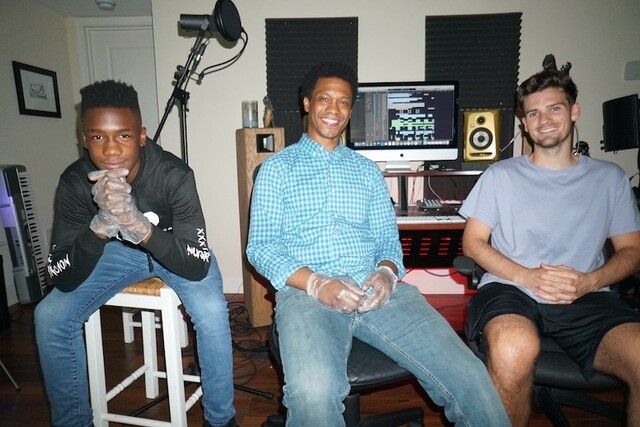Heather Parker had an entire album to record, but all the studios were closed.
For over a decade, Parker had been an assistant director to Gladys Knight’s Grammy Award-winning Saints Unified Voices Choir and had even produced the song “There is a Green Hill Far Away” for the Empress of Soul’s album Where My Heart Belongs, which received the NAACP’s Image Award for Outstanding Gospel Album in 2015. Parker had big dreams for this new project and planned to record the tracks with the Atlanta Super Choir before releasing the album this year. But when the pandemic hit, all plans came to a screeching halt.
Desperate for a studio, Parker stumbled across Miles Whitworth, a sound engineer who had worked with some of the biggest names in rap music. With the coronavirus giving Whitworth a little extra time on his hands and Parker having plenty of songs to record, the two decided to join forces and produced Shine, a 12-track album of faith-based children’s songs which was released earlier this summer.
Latter-day Saint listeners will recognize many of the numbers on the album with Primary songs like “Popcorn Popping,” “When I Am Baptized,” and “I Feel My Savior’s Love” on the list of tracks. But the beloved songs are anything but traditional as the album reimagines the old-time favorites in a variety of styles, including gospel, jazz, R&B, neo-soul, reggae, and Atlanta hip hop.
For Parker, the album isn’t just about reimagining children’s songs in creative ways—it’s also a celebration of what makes us all unique, using music as an avenue to honor a variety of cultures and faiths in order to bring all listeners closer to Christ.
The Real Deal
Parker has always been a songwriter at heart. In high school, the producer experimented with rap, sang in a girl group, and participated in choirs. Growing up in the South with a Methodist minister grandfather and her mother belonging to the same faith, Parker naturally connected with music that had ties to her upbringing—and that was exactly the type of music she wanted to highlight in Shine.
“I was exposed to a lot of music, and I could feel the Spirit in that music. And as I grew older and I think matured in my faith ... as I started to recognize how the Spirit worked, and how I conveyed the Spirit as well, I really have always longed to create something that other children like me could identify with—that they could say, ‘Oh wow, that felt different, but I loved it,’” she says. “That really deep South sound is something that is just in my soul. I just live for that sound.”
So when the opportunity presented itself to create an entire album with uplifting messages showcasing a variety of musical genres, Parker knew that she had to go for it. Still, despite her musical background and collaboration with Knight in the past, Parker had moments of self-doubt that she really could create what she envisioned. But in the end, she didn’t let those doubts stop her.
“To produce a full-scale album. ... I just didn’t feel all the way confident. You go from doing one song here and there to doing a full-scale album that’s going to be published—it’s like the real deal. And I just knew that I could do it. So I accepted it because I thought, ‘I always think I can’t do it and then I end up doing it.’”
Parker made voice samples and demos at home before collaborating with Whitworth at his “studio” apartment where they looked for beats and distorted sounds to get the right tone for each track. With help from other musicians, they also pulled off recordings for all the vocals in just one month and even had 10 songs left over that didn’t end up going on the album.

“It’s insane. It really is. I still can’t believe it. And I know it wasn’t my doing. I know for sure it was the Lord’s doing,” says Parker.
The Spirit was involved in the recording process as well, says singer Leslie Fatai Nau. In her recording of one of her longtime favorite Primary songs, “Reverence Is Love,” Nau recalls how the recording session was only 30 or 40 minutes. But partway into the session before doing another take of the song, she asked for a minute to pray in order to focus on her testimony that she wanted to convey through song.
“I’ve always felt that if I’m going to sing about Him, I have to be as genuine and real as possible. And so when singing about reverence for Him—that has always been a priority in how I worship Him,” Nau says. “For me, it’s all personal. It’s all trying to come from a real place which is where your heart and Spirit is.”

On the opposite side of reverent melodies, “While I Am Baptized” has a new twist on Shine, complete with scatting, an electric guitar, and an up tempo beat. Recognizing that the Primary favorite would resonate with both children and adults since it’s often heard at baptisms made singer Tishna Campbell especially look forward to recording it.
“I was so excited about the idea of a little kid hearing it and realizing, ‘Oh, this is something that I can kind of groove to. It doesn’t have to be something in-the-box churchy, exactly how we sing it in Primary—we can move, and we can feel rhythm.’ And I think with the whole album, that’s what I was most excited about, is [how it can] reach these little kids who grew up with different music,” she says, adding that as a child she grew up hearing a variety of music and didn’t always relate to the Church music that was available.
Although Parker had a vision for what she wanted the songs to sound like, each one didn’t always turn out the way she expected. At first, on the track “I Will Follow God’s Plan,” she planned on having a gospel group singing to a fun groove with lots of harmonies. But it “just wasn’t feeling right,” and she knew she couldn’t put it out there yet. But then two days before Parker’s deadline, singer Jalyn Macedone, who had been a background singer on the song, told Parker that she loved the original version of the song, which was much simpler.

Parker recalls that she laid down the original and loved it how it turned out.
“I prayed and I prayed, and it was just like ‘What do I do? What do I do?’ I really felt like I needed to have Jaylyn showcased as a singer on the album. It just wouldn’t leave me—that idea. And I called her and I said, ‘Look, would you be willing to come back to the studio?”
Macedone agreed, and not long afterward, Parker reached out to a cellist in her congregation, who was also able to record on the song. The result was just what they were looking for.
“I love how it turned out because the song is simple with just piano, vocals, and beautiful cello—no harsh beat, no intense bass or dynamic ad-libs or runs, which I believe truly allows the message of God’s plan to shine through and reach the listener because of its simplicity,” Macedone says.
The song also has personal significance for her, Macedone continues, as it is a reminder of Heavenly Father’s love for her and to continually trust in His plan.
“As a little girl, I remember feeling in my heart that Heavenly Father had my back and He had a plan just for Jalyn. I held on to that belief so tightly into my early adult life. After my mission, poor decisions and unforeseen challenges led me to completely forget that plan for several years. I had lost sight of who I was and who I was called to be. But now, I see clearer than I ever have before. Tomorrow is uncertain, but the knowledge that my Heavenly Father loves me, and things are working out for my good is all I need to keep going. He has a plan and I trust in it.”
“I Will Follow God’s Plan” was just one of many instances, Parker says, of seeing the Lord’s hand in the recording process of Shine.
“I knew that it was the right song that we needed to do. And there are just so many moments of instances like that where the right person came through at the right time and the Lord put them in my path,” she says.
Changing Things Up
Celebrating a variety of sounds from reggae to hip hop to soul, Shine isn’t your typical children’s song album. Many songs could be played anywhere—even the beach, says Parker—but it was also designed for the adult ear so everyone could enjoy it. That being the case, Parker sought out some of the best musicians in the industry, including artists who have worked with names like Mary J. Blige, Neyo, Kirk Franklin, and Miranda Curtis.
Shine also presents the opportunity to celebrate different cultures and honor a variety of backgrounds.

“This sort of provides a safe place for parents where they can expose their kids to more culture and more diversity and different sounds. And I think it’ll be surprising to see who gravitates to that. ... because I do think there are kids that really long for that and they’re touched really deeply by that,” says Parker.
Campbell adds that the variety of music on the album, like with her recording of “When I Am Baptized,” is reflective of the Church’s worldwide membership and celebrates different styles of worship.
“It’s nice when you get to hear that flair of diversity. Because honestly, the gospel is for everyone. It’s not just a one-size fit this kind of mold—like this is how you should be. But I feel because of how different it is, it gives us permission to be different in the way that we worship the Lord ... and the differences that a lot of people who are now joining the Church are bringing.”
The message of the music also mattered to Parker. With her love of rap, Parker thought Shine would be the perfect opportunity to take some of the elements children and youth love about popular genres today and put uplifting messages to them.
“The truth of it is that the rappers aren’t even rapping about anything these days. They’re not saying anything that’s halfway decent, the same as when we grew up. So it’s like, ‘Well, why not take some of these same ideas and these same concepts because people love them so much, and it just gets them moving, and gets them in motion, and it changes the mood of things. And let’s just put some wholesome words to it. You know, like why not? If you’re going to do it, then do it for Jesus,” she says.

The release of Shine also comes at a very fitting time, says Campbell, as including different races and cultures is a particularly relevant topic today.
“I think that we really, really needed the album right now with the climate of the world and especially the United States. I just think [people] really need to see that especially in our church we have a lot of growing to do, but we’re also making strides within the Church to be inclusive and to make people feel like they are a part of the Church. No matter how different they are or no matter what part of the world they’re coming from, we want them to feel comfortable and like this is a place that they can belong and where they’re supposed to be. And so I think [Parker’s] album really encompasses that this is not a church of the United States. This is a church of the world. And her music really represents that.”
Macedone agrees, stating that the music on Shine is much needed today as it crosses boundaries that words simply can’t.
“There is no better time than the present to share music about hope, believing in ourselves, and loving each other,” she says. There’s something about music that allows me to freely express myself that sometimes speaking words can’t. Sometimes when I speak, I stumble over my words or I worry about being politically correct. Music has a way of piercing your soul that often words are unable to.”
Let It Shine
Not only does the music in Shine celebrate different cultures, it highlights musicians of various representations too, including African, Mexican, Native American, African American, and Polynesian. The artists on the tracks also come from many religious backgrounds, such as Methodist, Baptist, Seventh-day Adventist, and Christian. This being the case, Parker hopes the songs will inspire not just members of the Church, but all people who have faith in Christ.

“I really wanted to create something that people could hand to their neighbor with ease, and I think we are divided in so many ways. And sometimes that’s something that we end up doing ourselves. But this was something for me, that was like we can all come together in worship and praise of Jesus Christ.”
Parker sought to have diversity and culture reflected on the album cover as well. With her Native American roots and her love for many styles of music, she says she didn’t always feel accepted while growing up within the Church. So on the album cover, she wanted to use photos of kids in their natural element. Letting them be fun and silly in their poses with all their quirks was very important to her.
“I wanted children to see themselves. It’s that simple. I think children deserve to say, ‘Hey, that looks like me. Hey, that looks like my friend.’ And it just makes it so much more inclusive,” Parker says. “I love all kinds of people. And I ended up just using a lot of people that I knew and thank goodness we know a lot of diverse people, but that was definitely very intentional.”

Nau adds that as people take to heart the message of the album and shine as the title suggests, they, in turn, will be able to share Christ’s love with others who need it.
“I would hope that they would understand that they have a light, that it’s acceptable and it’s worth noting. In God’s eyes, they are worth the light that they have and they can shine too, regardless of whether they’re a member of our Church or not. ... I feel like we need to really reach out and step outside of ourselves and really just embrace everyone around us, because maybe that will be the best way we can really reach the one that really needs Him right now.”
As listeners connect with this album, Parker hopes it will spark creativity for them with their own music, and in the meantime, help them feel the Spirit in a new light.
“I’ve tried my best with the record to take people on a journey and take them through some ups and some downs because I think that the Spirit communicates with each of us differently and that we should be happy and joyful—and we learn that in the scriptures,” she says. “I’m hoping that it will inspire other children and other artists to make the music . . . and to share the words and the ideas that they have inside of them.”



